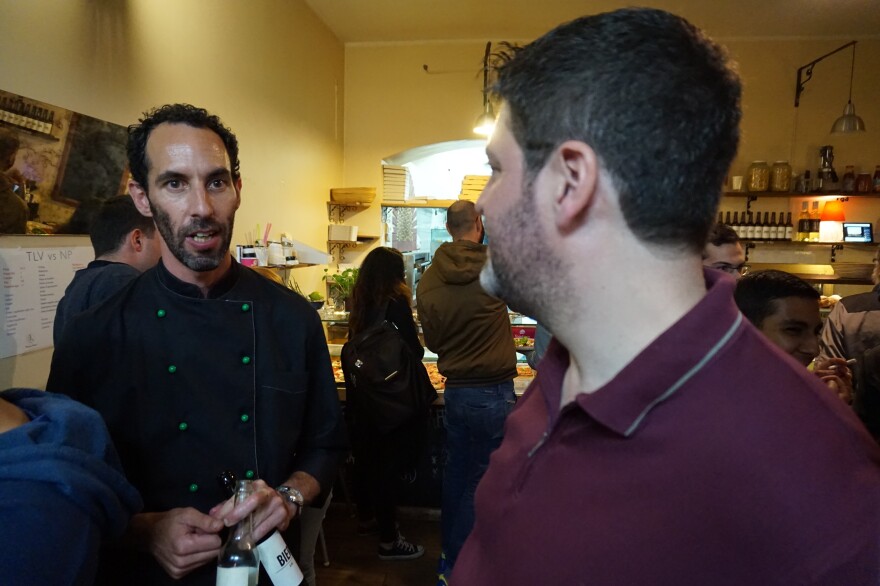For decades after the Holocaust, many Jews refused to visit Germany. Some still do.
But now it has become common to hear Hebrew spoken in the bakeries and bars of Berlin.
At least 10,000 Israelis are estimated to have moved to the German capital in the past decade, according to Tal Alon, the Berlin-based editor of the Hebrew-language magazine Spitz. (The Israeli Embassy in Germany said it had no official statistic.)
Though the community is much smaller than some of the other immigrant groups in the city of more than 3.5 million, Israelis punch above their weight culturally. They are helping drive Berlin's blossoming culinary scene, with several high-end Israeli restaurants in the city including Layla, opened last fall by Tel Aviv celebrity chef Meir Adoni. And the director of Berlin's Maxim Gorki Theater, Yael Ronen, is Israeli, as is Daniel Barenboim, the conductor of Berlin's state opera.

"If somebody would tell me 10 years ago that one day I will live in Germany, I will speak German, and I would think about applying for [a] German passport, I would say they are crazy," said Israeli food designer Itay Novik, sitting at a Berlin café with an Israeli friend.
Much of Novik's mother's family was killed in the Holocaust, and he never considered visiting Germany. But he has lived in Berlin for eight years, having fallen in love with the city — and with a German man.
Many Israelis who have moved to Berlin are like him: gay, or politically liberal, or freelancers in artistic and creative fields, who feel at home in the avant-garde, anything-goes city. In recent years, the Israeli ex-pat community has expanded to include a more diverse demographic including tech workers at startups.

"It's a city where people don't interfere in your life," said Novik, co-author of a new Berlin Jewish food guide and contributor to a German-language Jewish cookbook. He recently held an experimental Eastern European Jewish-style dinner event for a Berlin food festival that he called Strictly Non-Kosher, featuring unorthodox recipes such as traditional gefilte fish cakes made of non-kosher eel.
"Israelis are made to feel very welcome in Berlin," said his friend Nirit Bialer. She runs a Berlin-based initiative called Habait to acquaint Germans with Israeli culture.
Some young Israelis apply for German, Polish or other European passports, gaining the citizenship that was stripped from their grandparents during the Nazi era. Often, Germans express gratitude that so many Israelis have made Berlin their home, despite the history.
"It's great that they find it cool to live here," said Felix Klein, the German government's commissioner for Jewish life in Germany and the fight against anti-Semitism. "They are contributing very much."
"The Germans always talk about reviving Jewish life in Germany. Of course, there's no way to reconstruct what they killed," said Alon, editor of the magazine catering to Israelis in Germany. "But with time, they start to understand they have to live with substitutes. Israelis in a way are a substitute for the big Jewish German ethos that was destroyed."
Many Israelis choose Berlin for one practical draw: the cheaper cost of living stemming from years of underdevelopment after the 1989 fall of the Berlin Wall. That has drawn controversy back home. Several years ago, an Israeli government minister accused Israeli emigres of ignoring the Holocaust to go live on the cheap.

It's hard for Israelis in Berlin to escape historical baggage, a theme explored in The Land of Milk(y) and Honey, a recent play put on in a Berlin theater. Israeli actors shared real-life anecdotes from Israelis in the city, like this one, which drew laughs from the audience:
"My partner and I go to sex clubs sometimes. I meet with German people a lot. When they find out I'm from Israel they always say, 'Ah, it was such a bad thing, with Hitler and the Holocaust. I don't feel anything bad toward the Jews.' And I just think to myself, 'OK, thank you for saying that right now.' "
As Berlin continues to develop, Israelis have joined a real estate rush driving up rental prices in the city, with Israeli investor groups purchasing entire Berlin apartment buildings in recent years. To deflate the ballooning rents, some in Berlin are calling for restricting foreign investment or even expropriating foreign-owned apartments. But Israelis still find it worthwhile to invest in the city.
"The prices are going to double themselves within the next 10 years for sure," said Nizana Brautmann, an Israeli real estate surveyor in Berlin and manager of B-Space Estate, an investment company.
The return on investment is not the only satisfaction, she said.
When Israeli clients close on a Berlin apartment, she takes them to a notary. Outside the window is a memorial marking a spot where Nazis shipped Jews off to concentration camps.
"From the notary's office, we are looking down to this small memorial, and often I think, 'You see? We're back,' " Brautmann said. "And this is a good feeling."
Copyright 2020 NPR. To see more, visit https://www.npr.org. 9(MDAxNDQ2NDAxMDEyNzU2NzM2ODA3ZGI1ZA001))




